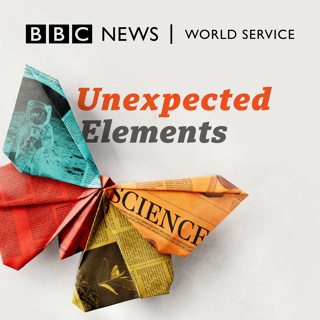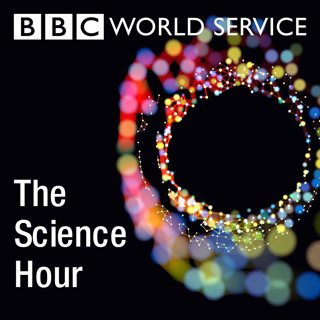
How dust affects the world
This week, a new report into the dangers that sand and dust storms pose to the world's health and economy has inspired us to delve in the science of dust.First, we look at the report by the World Meteorological Organisation and hear about what can be done to mitigate the dangers of dust. We also find out the surprising way in which the Sahara is keeping the Amazon rainforest well-fed, and Derek Fabel from the University of Glasgow tells us how dust can help us to determine the age of glaciers.Plus, the dusty maths that took 15 years to solve, and the musician who swapped jazz for space dust.All that, and many more Unexpected Elements.Presenter: Caroline Steel Producers: Margaret Sessa-Hawkins with Alice Lipscombe-Southwell, Minnie Harrop, Lucy Davies, and Robbie Wojciechowski
18 Juli 49min

Sharks, albatrosses, the Jaws theme and fishing
Shark Awareness Day on 14th July sends us on a deep dive into marine biology.First, we learn how shark-inspired materials could help make aeroplane flights more efficient.Next, we hear about the fish that don’t flee from sharks... instead, they seek them out to help them hunt. Bob Duke, Meyerson Professor of Music and Human Learning at the University of Texas, Austin, joins us in the studio to reveal how and why the iconic Jaws music taps into our psychology to leave us trembling. We also hear about a couple of tiny islands in the Southern Ocean, on which an unexpected predator is wreaking havoc.Plus, why a tiny fish is being ground up and fed to other fish. All that, plus many more Unexpected Elements. Presenter: Marnie Chesterton, with Leonie Joubert and Christine Yohannes Producer: Alice Lipscombe-Southwell, Imaan Moin, Minnie Harrop and Margaret Sessa Hawkins
11 Juli 50min

Cargo ships, chemical spills and caribou
The X-Press Pearl shipping disaster takes us on a voyage through shipping-related science. First, we learn about how pollution from the X-Press Pearl explosion impacted the foundation of the marine food web – plankton. We also hear about an innovative system that can help slash the shipping industry’s greenhouse gas emissions. And we take a short trip in a time-machine back to the Stone Age, where biological anthropologist Professor Yousuke Kaifu from the University of Tokyo explains what it takes to recreate a Palaeolithic voyage from Taiwan to the Ryukyu Archipelago. We also look at how artificial intelligence could help Canadian caribou cross sea ice, the science of lightning and thunder, and the tricky disputes around shipwrecks and treasure. All that, plus many more Unexpected Elements. Presenter: Marnie Chesterton, with Meral Jamal and Godfred Boafo Producer: Alice Lipscombe-Southwell, Minnie Harrop and Imaan Moin
4 Juli 49min

A roarsome episode
This week, Enigmacursor mollyborthwickae has been unveiled at London's Natural History Museum. This newly described herbivorous dinosaur has inspired us to take a stomp through the science of ancient animals, mass extinctions and fossils.First up, we hear about a shepherd who recently found a South African dinosaur, which has helped shed light on the period between the Triassic and Jurassic. We then take a look at some new theories that suggest the mass extinctions that wiped out ancient creatures may not have been as massive as we thought. But one extinction definitely is currently underway, according to ecologist Professor Dave Goulson. And that’s the mass extinction of insects. Plus, we find out the latest theory of why the Tyrannosaurus rex had such tiny arms, and we meet the rat ancestors that munched on dinosaurs. All that, plus many more Unexpected Elements. Presenter: Marnie Chesterton, with Candice Bailey and Camilla Mota Producer: Margaret Sessa Hawkins, with Alice Lipscombe-Southwell and Minnie Harrop
27 Juni 49min

Some really cool science
This week, the Florida Panthers beat the Edmonton Oilers at ice hockey’s Stanley Cup championship, which sent us skating into ice-related science.First up, we hear about an ancient ice skate that’s been unearthed in Prerov, Czech Republic, which sends us pondering about the physics of ice-skating. We then discover why licking a flagpole on a chilly day is a bad idea, before delving into the science of cryopreservation. Next up, we speak to Dr Mark Drinkwater of the European Space Agency, who reveals how satellites can help us monitor and better understand our planet’s melting ice sheets. Plus, what do you do if you want to play ice hockey but you live near the equator? All that, plus many more Unexpected Elements. Presenter: Marnie Chesterton, with Chhavi Sachdev and Sandy Ong Producer: Alice Lipscombe-Southwell, with Margaret Sessa Hawkins and Minnie Harrop
20 Juni 49min

Defuse and diffuse
World War II bombs were defused in Cologne, Germany, which has inspired us to explore the science of diffusion and defusing!First, we hear how new, artificially intelligent video generators are modelled on diffusion. We also hear about the health impacts of home aroma diffusers and candles. We’re joined by conflict-mediator Gabrielle Rifkind of the Oxford Process, to discuss the psychological stakes behind defusing conflict in wars and at home.We also taste-test the difference between raw and cooked broccoli, learn about in-insect synthesis, and explore an anechoic chamber. All that, plus many more Unexpected Elements. Presenter: Caroline Steel, with Tristan Ahtone and Edd Gent Producer: Imaan Moin, with Alice Lipscombe-Southwell, Minnie Harrop and Debbie Kilbride
13 Juni 49min

Gaming-inspired science
This week, get ready for a whole loot box of gaming-related stories!First up, we find out about a video game that could give people the power to battle misinformation. We also hear how scientists are putting harbour seals in front of a computer monitor to decipher how they navigate under the water. And Dr Brett Kagan from Cortical Labs joins us down the line to tell us why he taught a clump of brain cells to play the 1970s arcade game Pong. Along the way, we discover what happens when artificial intelligence tries to explain idioms, we learn about a tiny frog named after Bilbo Baggins and try to establish whether or not video games benefit your brain. All that, plus many more Unexpected Elements. Presenter: Marnie Chesterton, with Kai Kupferschmidt and Leonie Joubert Producer: Alice Lipscombe-Southwell, with Margaret Sessa Hawkins, Imaan Moin and Minnie Harrop
6 Juni 49min

Mission unexpectedly possible
With the new Mission Impossible film playing in cinemas, the Unexpected Elements team is channelling Tom Cruise’s energy to see if scientists can push the boundaries of what is considered ‘impossible.’ First up, we fuse medieval alchemy with particle physics and explore a method to turn lead into gold. We then look at the latest research that uses artificial intelligence to help us humans communicate with animals. We put the spotlight on a favourite trope of science-fiction films – time travel! String theorist Brian Greene of Columbia University explains how going to the past, or back to the future, may or may not be hypothetically possible. We also ponder ancient auroras, whether ants can plan a Hollywood-style heist, and what it takes to understand our consciousness. Presenter: Marnie Chesterton, with Affelia Wibisono and Andrada Fiscutean Producer: Imaan Moin, with Alice Lipscombe-Southwell Studio engineer: Mike Mallen
30 Maj 51min





















